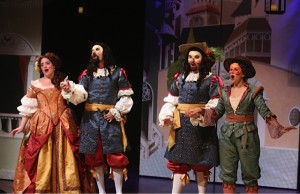EXCELLENT BY ALL APPEARANCES
It is rare enough to find early operas staged in the U.S., so to find a whole company devoted to their performance is truly extraordinary. Haymarket Opera Company performs them authentically, too, using baroque instruments and staging techniques current at the time of composition. Haymarket opens their short 2014-2015 season with Alessandro Scarlatti’s eminently enjoyable Gli Equivoci nel Sembiante (1679). Not to be confused with his more famous son Domenico, Alessandro wrote this opera at the precocious age of nineteen. (His contemporary, Henry Purcell, didn’t write his first opera, Dido and Aeneas, until his late twenties.)
As with Shakespeare’s Comedy of Errors, which predates it by some ninety years, Gli Equivoci nel Sembiante is a romantic comedy that hinges on a case of mistaken identity involving twins separated at birth (the title translates to Equivocal Appearances). Fortunately, Domenico Filippo Contini’s libretto aims for greater simplicity of presentation than Shakespeare. There are just four characters: the twins Eurillo and Armindo and the sisters Clori and Lisetta. Clori and Eurillo are the amorous couple at the center of the story.
 The fragility of their love, however, is sorely tested by jealousy and misrepresentation. Lisetta, also in love with Eurillo, causes the first misunderstanding by altering one of her sister’s love letters in order to make Eurillo think that Clori loves another. Armindo unwittingly causes the other by impersonating Eurillo, the twin he has never known. He initially falls in love with both sisters. Once the misunderstandings are explained and cleared up, Armindo and Lisetta happily pair off and Eurillo is reunited with his long lost brother. Everyone wins.
The fragility of their love, however, is sorely tested by jealousy and misrepresentation. Lisetta, also in love with Eurillo, causes the first misunderstanding by altering one of her sister’s love letters in order to make Eurillo think that Clori loves another. Armindo unwittingly causes the other by impersonating Eurillo, the twin he has never known. He initially falls in love with both sisters. Once the misunderstandings are explained and cleared up, Armindo and Lisetta happily pair off and Eurillo is reunited with his long lost brother. Everyone wins.
Superbly cast as Clori and Eurillo, mezzo soprano Chelsea Morris and tenor Karim Sulayman shine in their respective roles. Both have beautifully rounded and melodious voices that capture the delicacy and emotion of Scarlatti’s lyrical and intricate scoring. As her voice soars heavenward with such exquisite singing, it is easy to why Contini describes her character as a ’˜nymph.’ When Morris and Sulayman sing the occasional duet, of which there are sadly too few, their voices complement each other with breathtaking harmony.
Whereas Morris, Sulayman and Ryan Townsend Strand as Armindo take some time to warm up on stage, Erica Schuller as Lisetta is on fire from the get-go. She immediately captivates the audience with her soaring soprano, vivacious personality and expressive gesticulations. Strand’s clear tenor, occasionally flat and colorless, reveals itself best in the role’s more florid passages.
Many viewers might be puzzled by the production’s unusual staging, by which the actors rarely look at each other, but more often directly at the audience. In trying to capture the dramatic style of the time, stage director Sarah Edgar turned to Andrea Perrucci’s A Treatise on Acting (1699). The result is an artificiality that highlights  the overdrawn characters and their rollercoaster emotions. Moreover, the use of masks that force the tale’s lovers to portray their feelings through gesture serves to heighten the dramatic artifice.
the overdrawn characters and their rollercoaster emotions. Moreover, the use of masks that force the tale’s lovers to portray their feelings through gesture serves to heighten the dramatic artifice.
Meriem Bahri’s lavish costume design brings the baroque era vividly to life through embroidered silks, flowing linen sleeves and colorful ribbons on every surface. Brian Novatny’s set design is spare, but effective. Music director Craig Trompeter gracefully conducts the period orchestra with viola da gamba in hand. John Lenti’s theorbo and Jory Vinikour’s harpsichord lend otherworldly charm and wit to Scarlatti’s delightful orchestration. Haymarket is an indispensable company, and I look forward to the next production: Georg Philipp Telemann’s Don Quichotte auf der Hochzeit des Comacho.
photos by Chuck Osgood and Elliot Mandel
Gli Equivoci Nel Sembiante (Equivocal Appearances)
by Alessandro Scarletti
Haymarket Opera Company
Mayne Stage, 1328 W Morse Ave
ended on October 25, 2014
for info, call (866) 468-3401 or visit www.haymarketopera.org
for more info on Chicago Theater, visit www.TheatreinChicago.com


{ 1 comment… read it below or add one }
In keeping with the storyline, I think you completely confused the male characters in your vocal critique, much like the women did.